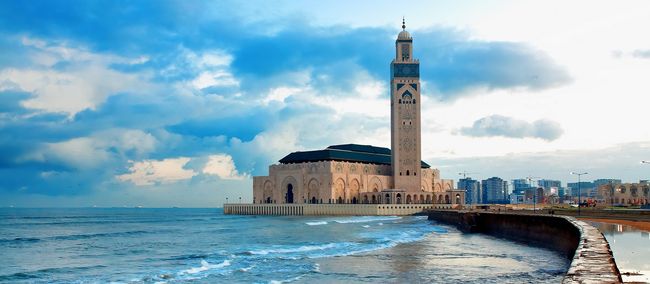Certainly! Casablanca is a vibrant and culturally rich city located in western Morocco, along the Atlantic Ocean. It is the largest city in Morocco and serves as the country's economic and business hub.
-
History: Casablanca has a relatively short history compared to other Moroccan cities. It was established as a small village by Berber fishermen in the 7th century and remained relatively unknown until the 19th century. The city's development began during the French colonial period in the early 20th century.
-
Economic Importance: Casablanca is the economic capital of Morocco and a major economic center in North Africa. It is home to the largest port in the country, which serves as a crucial link for international trade. The city is known for its dynamic business environment, financial institutions, and industrial sectors.
-
Architecture: Casablanca showcases a fascinating blend of architectural styles. The city's architecture reflects its French colonial past as well as contemporary influences. Notable landmarks include the Hassan II Mosque, one of the largest mosques in the world; the art deco buildings of the 20th-century downtown area; and the modern skyscrapers that dominate the city's skyline.
-
Cultural Diversity: Casablanca is a melting pot of cultures and religions. The city is home to people from various ethnic backgrounds, including Arabs, Berbers, and foreigners. This diversity is reflected in its vibrant arts scene, culinary offerings, and music festivals.
-
Film Legacy: Casablanca is renowned for its association with the classic Hollywood film "Casablanca" (1942), starring Humphrey Bogart and Ingrid Bergman. Although the movie was primarily shot in studios in California, it immortalized the city's name and romanticized its image.
-
Attractions: In addition to the Hassan II Mosque, Casablanca offers several attractions for visitors. The ancient medina (old town) showcases traditional Moroccan architecture, narrow streets, and bustling markets. Other notable sites include the Corniche, a beachfront promenade; the Morocco Mall, one of Africa's largest shopping centers; and the Habous Quarter, known for its traditional Moroccan craftsmanship.
-
Gastronomy: Casablanca offers a diverse culinary scene, featuring traditional Moroccan dishes as well as international cuisine. Visitors can enjoy delicious tagines, couscous, fresh seafood, and a variety of street food options. The city also has a vibrant cafe culture, where you can relax and savor Moroccan mint tea.
Casablanca's unique blend of history, culture, and modernity makes it a fascinating destination for travelers seeking an authentic Moroccan experience.



